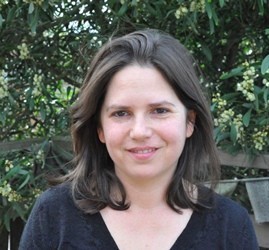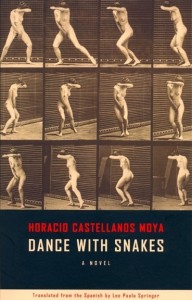
Next Tuesday, October 29th, the English Department will welcome writer Lucy Corin as part of our Readings and Lectures series (BC 163, 7:30pm). As a preview, we offer a glimpse at some insights of Corin’s on writing, reading, and publishing. Here’s the report from English major Athena Lathos’ recent interview with Lucy Corin.
On the English Department website of the University of California, Davis, where Lucy Corin works as an Associate Professor of English, a brief biography lists her works and accomplishments:
“Lucy Corin is a fiction writer. She is the author of two short story collections One Hundred Apocalypses and Other Apocalypses (McSweeney’s Books, 2013); The Entire Predicament (Tin House Books, 2007), and the novel Everyday Psychokillers: A History for Girls (FC2 in 2004). Her work has appeared in journals including American Short Fiction, Ploughshares, The Southern Review, Conjunctions, and Tin House Magazine, and in anthologies such as Algonquin’s New Stories from the South: The Year’s Best (1997 and 2003). She was the Walter E. Dakin fellow at the Sewanee Writers’ Conference in 2006 the Margaret Bridgman Fellow at Bread Loaf in 2008, and the American Academy of Arts and Letters John Guare Writers Fund Rome Prize Fellow at the American Academy in Rome in 2012-13.”
While this biography is an undeniable testament to Lucy Corin’s skill and success as a fiction writer, I had the opportunity during a phone interview to learn more about her than her resume suggests. She kindly shared with me a wealth of information and advice regarding her writing process, her views on publication, and her understanding of what it truly means to be a scholar of English. 
Which works of literature were most moving or formative for you as a writer?
I guess it depends on how far back you go. I really liked The Basketball Diaries, by Jim Carroll, when I was a teenager. I had a Dostoyevsky phase in my late teens that was pretty important. I obsessively read Flannery O’Conner when I was first trying to figure out how to be a writer. Donald Barthelme was also very important and formative.
What is your approach to writing in regard to your writing process and/or any editing techniques?
I think that there are certain things that I do every time I write that you probably hear about from every writer. Many times you will think you are done before you are done for the last time.
It’s a very broad question, though. Every piece is different. Sometimes I have notes because I jot down things when I think of them. Sometimes I start because something has happened in my life and it feels like there is a story in it. Sometimes I will hear somebody say something and I will start from that. You mentioned something about how a lot of writers let pieces sit; some need to sit longer than others. Some you give up on and some you come back totwo years later.
It’s a lifestyle. There is no regimen; you know what I mean?
How do you feel that your work has changed since you began writing?
That one I can wrap my head around pretty well. I think that the longer I write, the more I ask myself to take on in terms of material. The thing that hasn’t changed in my writing is that I’ve never been interested in doing the same thing twice. So every time I sit down to do something, I feel like I’m inventing from scratch, but of course there are common threads that maybe I’m not even aware of. My own attitude about things is that every time I start a new project, I try things that I’ve never tried before. As soon as I recognize myself doing something that I’ve done before, I try to do something else. 
So how has it changed? I guess I do more work than I did when I was younger. I was sort of on the semester system; I felt like I was writing just about two stories every six months. Now, I can produce a lot more pages with confidence. It’s easier to produce good quality writing by the page than it used to be. I know more quickly when there’s a sentence that I like and when there’s one that I don’t like.
What is your advice to young people who aspire to get something published? What should they keep in mind as they are trying to get their work read and considered for publication?
My first piece of advice is to look very carefully at where your desire to get published comes from. Don’t make any assumptions about the meaningfulness of being published. I think a lot of people can get caught up in the idea of the “celebrity offer” because that’s how book marketing works—it makes you really excited about what might be in the offer. But it’s so much more complicated than that, and so much less meaningful than that in some ways.
I think that there’s a lot of great advice out there. You can Google it and it’s written a thousand ways: read the publication you submit to; submit to the places that publish things that look like your stuff; follow the rules, but do it relentlessly and unemotionally– that’s another one. But that is just standard advice, that’s nothing new, and what I would add to that is just to really take a good look at why that’s a meaningful thing for you to do. Do a little self-therapy about it. Why do you care about it? What part of you is the part of you that wants to publish? And do you like that part of you?
If you are doing it because you think you are going to get attention for it, then that is one reason. You might get attention for it, but you probably won’t. So you have to think about what else is in it for you. And what does it have to do with making good art? If it helps you make better art, then great!
In which ways do you think an English or Creative Writing Major is valuable to students?
I am a big believer that the point of getting a college education is to stretch your brain, and I think that making your brain more elastic will help you make wiser choices as an adult. I’m a big believer in the value of critical thinking, and I’m a big believer in the power of making a habit out of trying to see things from points of view that are different from your own. I’m also a big believer in trying to look at yourself from a critical distance. Learning to apply your reading skills to your own writing and to people that you know [is valuable]. That’s why the workshop is so great, because you have a person that you know and you have the thing that they wrote that is connected to them but is not the same as them.
 I think all of those multiple levels are stretching your ability to take on a variety of perspectives and that helps you think better. And if you can think better, then you have the capacity to make better, more interesting choices with your life.
I think all of those multiple levels are stretching your ability to take on a variety of perspectives and that helps you think better. And if you can think better, then you have the capacity to make better, more interesting choices with your life.
Finally, is there something that you have read recently that you would recommend?
You know who I’m reading right now? His name is Horacio Castellanos Moya. The book of his that I’m reading is called Dance with Snakes.
And you enjoy it?
Well, the first ten pages are awesome!
